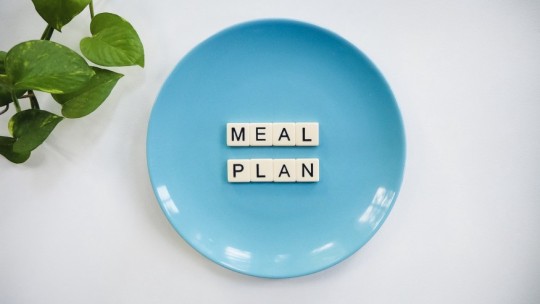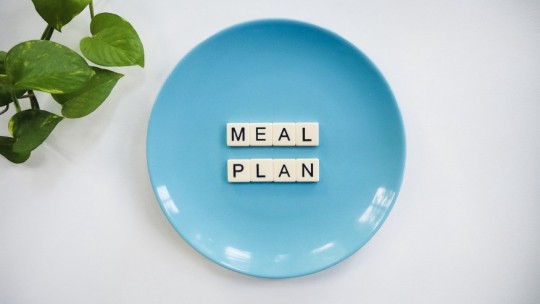Text
Best diet plan for men
There’s no one-size-fits-all answer to the best diet plan for men, as everyone’s nutritional needs are unique and may depend on factors such as age, activity level, and health status. However, a healthy diet for men generally includes a balanced mix of whole grains, fruits and vegetables, lean protein sources (such as chicken, fish, and beans), and healthy fats (such as nuts and avocados). It’s also important to limit processed foods and sugar, and to drink plenty of water. It’s recommended to consult a healthcare professional for personalized recommendations.

1. Mediterranean Diet: This diet emphasizes whole foods, fruits and vegetables, nuts, and healthy fats like olive oil.
2. DASH Diet: This diet focuses on reducing sodium intake and includes a variety of nutrient-rich foods, such as whole grains, fruits and vegetables, and low-fat dairy products.
3. High-Protein Diet: This diet emphasizes protein-rich foods, such as lean meats, eggs, and dairy products, and limits carbohydrates.
4. Plant-Based Diet: This diet emphasizes whole, plant-based foods and limits animal products.
5. Intermittent Fasting: This eating pattern involves cycling between periods of fasting and eating, and may help with weight loss.
6. Keto Diet: This high-fat, low-carb diet puts the body in a state of ketosis, which can lead to weight loss.
7. Low-Calorie Diet: This diet involves reducing overall calorie intake, typically by limiting portion sizes or choosing low-calorie foods.
It’s important to remember that individual needs and preferences will influence which meal plan is best. It’s recommended to speak with a healthcare professional before starting any diet plan.
What to keep in mind when choosing a diet plan
When choosing a diet plan, it’s important to consider the following factors:
1. Sustainability: Choose a diet that is realistic and that you can maintain over the long term. Avoid fad diets that restrict certain food groups or are too difficult to stick to.
2. Nutritional Value: Ensure that the diet provides a balance of essential nutrients, including protein, carbohydrates, healthy fats, vitamins, and minerals.
3. Safety: Avoid diets that are overly restrictive or that eliminate entire food groups, as these can lead to nutrient deficiencies.
4. Health Status: Consider any medical conditions or food allergies when choosing a diet, and make sure that the diet is safe and appropriate for you.
5. Lifestyle: Choose a diet that fits with your lifestyle and that you can realistically stick to, such as a diet that is compatible with your schedule and cooking abilities.
6. Goals: Consider what you hope to achieve with the diet, whether it’s weight loss, improved athletic performance, or improved overall health.
It’s always best to consult with a healthcare professional before starting any diet, as they can provide personalized recommendations based on individual needs and health status.

Here’s a general workout plan for men looking to lose weight:
· Cardiovascular exercise: Start with 30–45 minutes of moderate-intensity cardio exercises such as running, cycling, swimming or jumping rope. Increase the duration and intensity as you progress.
· Strength training: Incorporate strength training exercises like squats, deadlifts, push-ups, and bench presses into your workout routine, 2–3 times a week. This will help you build muscle and boost metabolism.
· High-intensity interval training (HIIT): HIIT involves alternating between high-intensity and low-intensity exercises. This type of workout is efficient for burning calories and improving cardiovascular fitness.
· Active recovery: Incorporate active recovery activities such as yoga, foam rolling, or stretching into your routine to help you recover and reduce the risk of injury.
· Healthy diet: In addition to exercise, it’s important to follow a balanced and calorie-controlled diet to support weight loss goals.
Remember to start slow, listen to your body, and consult a healthcare professional before starting any new exercise program.
A healthy rate of weight loss for men is typically considered to be 1 to 2 pounds per week. Losing weight at a slower rate allows for a more sustainable and gradual reduction in body mass, and it also allows for changes in lifestyle habits that can be maintained over the long term. Rapid weight loss is not sustainable and is often accompanied by loss of muscle mass and reductions in metabolic rate. It’s always best to consult with a healthcare professional for personalized recommendations based on individual needs and health status.
Conclusion
In conclusion, a successful weight loss food plan for men should include a balanced diet that is rich in nutrients and low in calories. Here are some key elements to consider when planning your diet:
· Reduce calorie intake: To lose weight, you need to consume fewer calories than you burn. Reduce your calorie intake by eating smaller portion sizes and limiting your intake of high-calorie, processed foods.
· Increase protein intake: Protein is essential for building and maintaining muscle mass. Aim to consume lean protein sources like chicken, fish, and tofu in every meal.
· Eat plenty of fruits and vegetables: Fruits and vegetables are low in calories and high in fiber, vitamins, and minerals. Make sure to include a variety of these foods in your diet.
2 notes
·
View notes
Text
How women loss weight fast?
There is no one-size-fits-all answer to this question, as weight loss can vary greatly from person to person depending on several factors such as age, metabolism, lifestyle, and overall health. However, some general tips for fast weight loss for women include:
1. Eating a healthy and balanced diet that is low in calories and high in nutrients.
2. Incorporating regular physical activity into your routine, such as cardiovascular exercises and strength training.
3. Drinking plenty of water to stay hydrated and helps control appetite.
4. Limiting or avoiding highly processed foods, added sugars, and unhealthy fats.
5. Getting enough sleep, as lack of sleep has been linked to weight gain.
It’s important to note that fast weight loss is not always healthy or sustainable, and crash dieting can be harmful to your health. It is recommended to aim for a slow and steady weight loss of 1 to 2 pounds per week. Before starting any weight loss program, it’s important to consult with a healthcare professional to ensure it’s safe and appropriate for you.
21 Simple Weight Loss Tips for Women
Here are 21 simple weight loss tips for women:
1. Eat a healthy breakfast every day.
2. Keep track of your calorie intake.
3. Drink plenty of water throughout the day.
4. Reduce your portion sizes.
5. Incorporate more fruits, vegetables, and whole grains into your diet.
6. Avoid sugary drinks like soda and juice.
7. Limit your intake of processed foods, unhealthy fats, and added sugars.
8. Eat slowly and chew your food well.
9. Get enough sleep every night.
10. Avoid eating late at night.
11. Use a smaller plate to help control portion sizes.
12. Find healthy alternatives to high-calorie snacks.
13. Exercise regularly, including both cardiovascular and strength training.
14. Try stress-reducing activities like yoga or meditation.
15. Avoid skipping meals.
16. Keep healthy snacks on hand for when you get hungry.
17. Make healthy choices when eating out.
18. Don’t eat when you’re emotionally hungry.
19. Avoid eating in front of the TV or while using your phone.
20. Find a workout buddy for motivation and support.
21. Celebrate your successes, no matter how small they may be.
Remember, consistency and patience are key to successful weight loss. It’s important to focus on making small, achievable changes to your lifestyle rather than attempting drastic and unsustainable diets.

There is no one-size-fits-all answer when it comes to the best diet plan for weight loss, as different diets may work better for different people depending on their individual needs and goals. However, some of the most effective diets for fast weight loss include:
· Low-carbohydrate diets: These diets limit the intake of carbohydrates and can lead to quick weight loss, especially in the first few weeks.
· Intermittent fasting: This involves alternating periods of eating with periods of fasting, which can lead to a reduction in overall calorie intake and promote weight loss.
· High-protein diets: These diets increase the proportion of protein in the diet, which can help to reduce appetite and increase feelings of fullness.
· Meal replacement diets: These diets involve replacing one or more meals with a low-calorie, nutrient-dense shake or bar.
It’s important to note that any diet that promises rapid weight loss is likely to be unsustainable and not nutritionally balanced. The best diet plan for weight loss is one that is healthy, nutritionally balanced, and can be sustained over the long-term. Before starting any diet, it’s important to consult with a healthcare professional to ensure it’s safe and appropriate for you.

There is no single best exercise for weight loss, as the most effective exercise for weight loss depends on several factors, including an individual’s fitness level, preferences, and weight loss goals. However, some of the best exercises for fast weight loss in women include:
1. High-Intensity Interval Training (HIIT): HIIT involves short bursts of high-intensity exercise followed by periods of rest, which can help to increase metabolism and burn more calories.
2. Cardiovascular exercises: Activities like running, cycling, and swimming can help to increase heart rate and burn calories quickly.
3. Strength training: Resistance exercises, such as weightlifting, can help to build muscle mass, boost metabolism, and increase overall calorie burn.
4. Yoga and Pilates: These low-impact exercises can help to increase flexibility, balance, and strength, as well as reducing stress and promoting weight loss.
It’s important to find an exercise routine that is enjoyable and sustainable, as sticking to an exercise program is key to seeing results. It’s also important to consult with a healthcare professional before starting any new exercise program, especially if you have any health concerns.
Conclusion
In conclusion, fast weight loss for women can be achieved through a combination of healthy eating and regular physical activity. It’s important to adopt a nutritionally balanced diet that is low in calories and high in nutrients, as well as to engage in regular exercise that challenges the body and increases metabolism. Some of the most effective diets for weight loss include low-carbohydrate diets, intermittent fasting, high-protein diets, and meal replacement diets. Some of the best exercises for weight loss include High-Intensity Interval Training (HIIT), cardiovascular exercises, strength training, and yoga and Pilates. However, it’s important to remember that rapid weight loss is not always healthy or sustainable, and it’s best to aim for a slow and steady weight loss of 1 to 2 pounds per week. Before starting any weight loss program, it’s important to consult with a healthcare professional to ensure it’s safe and appropriate for you.
1 note
·
View note
Text
How to loss weight after pregnancy?
Here are some general tips to help you lose weight after pregnancy:
Eat a healthy diet: Focus on whole foods such as fruits, vegetables, whole grains, and lean proteins. Avoid processed and high-calorie foods.
Stay hydrated: Drink plenty of water throughout the day.
Exercise regularly: Aim for at least 30 minutes of moderate exercise most days of the week. This can include activities such as walking, yoga, or swimming.
Breastfeeding: Breastfeeding can help you burn extra calories and lose weight after pregnancy.
Be patient: Losing weight after pregnancy takes time, so be patient and don’t expect to see results overnight.
It’s important to remember that every woman’s body is different, and the rate at which you lose weight may vary. It’s also important to consult your doctor before starting any weight-loss program, especially if you had a complicated pregnancy or delivery.
Postpartum Weight Loss: How to Lose Weight After Having a Baby
Start slow and be patient. Rapid weight loss can harm both you and your baby, so focus on losing weight gradually and healthily.
Breastfeed: If possible, breastfeeding can help burn calories and shed postpartum weight.
Stay hydrated: Drink plenty of water and limit sugary drinks.
Eat a balanced diet: Include plenty of fruits, vegetables, whole grains, and lean protein in your diet.
Get active: Incorporate physical activity into your daily routine, such as walks with your baby or gentle yoga.
Get enough sleep: Aim for 7–8 hours of sleep per night to support your body’s recovery and weight loss efforts.
Find help. Surround yourself with supportive friends and family, and think about joining a group that helps people lose weight after giving birth.
Remember, everyone’s postpartum weight loss journey is different, and what works for one person may not work for another. Consult with your doctor before starting any weight loss program.

Here’s a sample diet plan to help you lose weight after pregnancy:
Breakfast: whole grain toast with avocado and scrambled eggs.
Snack: Greek yoghurt with berries.
Lunch: grilled chicken salad with mixed greens, veggies, and a vinaigrette dressing.
Snack: Apple slices with almond butter.
Dinner: grilled salmon with roasted vegetables and quinoa.
Dessert: Fresh fruit or a small serving of dark chocolate.
This sample diet plan emphasizes whole foods and minimizes processed and high-calorie foods. It also provides a good balance of carbohydrates, proteins, and healthy fats to help keep you feeling full and satisfied.
Keep in mind that this is just a sample and may need to be adjusted based on your individual calorie needs and food preferences. Consult with a registered dietitian for a personalized and well-rounded diet plan.
How long does postpartum weight loss take?
The length of time it takes for a woman to lose weight after giving birth can vary. Factors that can impact postpartum weight loss include a woman’s starting weight, her diet and exercise habits, and her overall health. Some women may lose weight quickly, while others may take several months or more to reach their pre-pregnancy weight. On average, it can take anywhere from several weeks to several months for a woman to return to her pre-pregnancy weight. It is important for women to be patient with themselves and to focus on making healthy lifestyle choices rather than stressing about the number on the scale.
2 notes
·
View notes